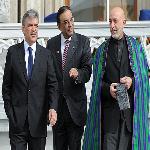Foreign ministers are meeting in Turkey this week to endorse Afghan efforts for a political solution to the decade-long conflict and to determine a plan for a sustainable Afghan economy. Analysts say the cooperation of Afghanistan's neighbor Pakistan is crucial to these efforts, particularly in the Afghan-led reconciliation process with insurgents.
U.S. and NATO forces plan to end their combat role in Afghanistan by the end of 2014, after transferring security responsibility to their Afghan counterparts.
This week's regional meeting in the Turkish city of Istanbul followed by the Bonn conference in early December are part of efforts to keep the international community, especially Afghanistan's neighbors, engaged following the withdrawal of international troops.
But several high-profile attacks have prompted skepticism about the ability of local forces to sustain security gains. And some analysts say reconciliation with Afghan insurgents, including the al-Qaida-linked militant Haqqani network, holds the key to end the violence.
Maleeha Lodhi is a former Pakistani ambassador to Washington. "I think the Istanbul conference will be an important step in getting the regional countries to endorse the idea of reconciliation in Afghanistan to ensure that there are no spoilers amongst regional countries for peace talks that lie ahead between the Afghan government and the Taliban," Lodhi stated.
Afghan and U.S. officials say Pakistan can play a crucial role in bringing insurgents to the negotiating table.
U.S. Secretary of State Hillary Clinton said last month that the United States supports an inclusive peace process in Afghanistan but will not hesitate to step up military action against insurgents unwilling to engage in such talks.
"Coalition and Afghan Forces are increasing the pressure on Taliban in Afghanistan and across the border," Clinton said. "We look to Pakistan to take strong steps to deny Afghan insurgents safe havens and to encourage the Taliban to enter negotiations in good faith. "
Pakistani leaders deny allegations the country is harboring Afghan insurgents. Foreign Minister Hina Rabbani Khar said during recent talks with Clinton that Pakistan is ready to do whatever it can to support efforts aimed at stabilizing Afghanistan.
"We must explore and give peace a chance on both sides of the border and as and when that does not work we can look whatever options exist. People living on both sides of the border have seen too many years of conflict," Khar noted. "Have seen too many years of strife, have seen too many years of uncertainty."
Analysts like former Pakistani diplomat Maleeha Lodhi say that improved ties between Washington and Islamabad will enable them to narrow differences on how to take the Afghan peace efforts further.
"Pakistan advocates that there should be a reduction of violence to create the space for these talks. America is still insisting that there is no contradiction in their fight and talk approach. Pakistan believes you can't do both at the same time nor can you expect Pakistan then to carry out contradictory objectives. So I think going forward these are important issues that the two countries will have to resolve and reconcile so that we can get to the common goal and it is a common goal to see peace in Afghanistan and peace on Pakistan's border," Lodhi said.
The conference in Istanbul is taking place after the September 20 assassination of Afghanistan's top peace negotiator, former President Burhanuddin Rabbani, which halted the reconciliation process in the country.
Afghanistan accused Pakistan's military spy agency of involvement in the attack, an allegation that Pakistan strongly denied.
Pakistani and Afghan leaders on Tuesday held their first talks since the assassination, in a Turkish-mediated meeting aimed at reducing tensions between the two neighbors.
November 01, 2011

Photo: AP
Turkish President Abdullah Gul, left, his Afghan counterpart Hamid Karzai, right, and President Asif Ali Zardari of Palistan walk after a meeting in Istanbul, Turkey. Turkey is hosting a conference this week on creating a regional strategy for improving security and economic development in Afghanistan ahead of the withdrawal of international combat forces by the end of 2014, , November 1, 2011.